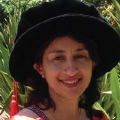Dr Sanjyot Vagholkar

One year on from completion of my PhD, it is both satisfying and a relief to be able to reflect on the whole experience. Undertaking a PhD on a part-time basis means you devote a significant chunk of your life to it – in my case almost seven years. Things happen along the way, both to you and the people around you, and yet you still seem to be enrolled and being asked the perennial question “How is your PhD going?” I am thoroughly enjoying not having to answer that question any longer.
I came to a PhD via a career in general practice. My earliest foray into teaching and research was via an academic registrar post. That experience allowed me to see the possibility of developing another set of skills apart from being a clinician and kindled an interest in pursuing academic work. Following some years of involvement in general practice teaching, I found myself working at the GP Unit at Fairfield Hospital, one of CPHCE’s research hubs. It was there that I had the opportunity to become involved in primary care research in a substantial way.
After testing the waters for a while by contributing to various projects, I found myself enrolling in a higher degree at UNSW, twenty years after graduating in medicine from the same institution. What tipped me over that line and decide to commit to a PhD? I had never really envisaged doing a PhD early in my career and then slowly after working in academic departments the idea started to rub off on me, probably helped by subtle and sometimes not so subtle hints from some of my senior colleagues. I think it was partly almost a challenge to myself, and partly that I wanted to have choices in the future about what I could do in general practice.
The topic of my thesis was absolute cardiovascular risk assessment and its impact on prescribing in general practice. One of the things that was important to me in undertaking a PhD was that the topic needed to be important and relevant to clinical general practice. Cardiovascular risk and medications are bread and butter general practice work. I deal with it all the time as a clinician, so investigating something that could contribute in some small way to improving our understanding of this topic seemed a really useful thing. My experience has been that when I talk with GPs they get the topic and they can see how it is relates to their practice. This really reassures me that I wasn’t just living in some ivory tower for seven years.
I was lucky to receive a RACGP grant that allowed me to conduct a pilot study for the first stage of my thesis, and then was part of the team at CPHCE that was successful in obtaining an NHMRC primary care grant to conduct a RCT exploring absolute cardiovascular risk assessment. It was data from this trial that provided me with the core material of my analysis. Conducting the pilot study and being an investigator on an RCT gave me invaluable experience in how to do research. My work involved a combination of quantitative and qualitative methods, and just like medicine, research has its own language and processes. Having now completed a PhD, I guess I feel like I get the language a bit better.
Research is rarely about an individual and I would never have been able to complete this PhD without the guidance of numerous people. I was fortunate to have very skilled and supportive supervisors as well as the opportunity to work with a great research team at CPHCE. You often hear people say they hated their research topic by the time they got to the end. I think one of the few advantages of completing a PhD part-time while working full-time (apart from not being poor) is that you are never truly immersed in the work and so you probably don’t get time to be sick of your topic. I did get a small taste of immersion when I took a year out from employment to write up my thesis. I think I can honestly say I wrote most of my thesis working at home in my pyjamas.
Having taken the risk of leaving my job, I have been fortunate to land on my feet post-PhD. Earlier this year I took up the position of Deputy Director of Primary Care and Clinical Associate Professor at Macquarie University Health Services Centre. We are trying to expand the role of the GP Clinic here and develop innovative models of integrated care with specialist services. The Faculty of Medicine and Health Sciences at the university sees the three pillars of clinical work, teaching and research as integral in the provision of health care and my role here is to help develop this in the primary care setting. I’m still finding my feet to some extent but it is an exciting opportunity. I certainly hope to make use of the skills I have acquired in research. I guess I would say that although the PhD is complete, the future is a work in progress.

